|
Pax
Author: Bernd Eisenstein
Publisher: Iron Games
Year: 2011
review by

| x |
|
|
|
|
|
|
|
|
|
|
|
|
|
|
|
|
|
|
|
|
|
|
|
|
|
|
|
|
|
|
|
|
|
|
|
|
|
|
|
|
|
|
|
|
|
|
|
|
|
|
|
|
|
|
|
|
|
|
|
|
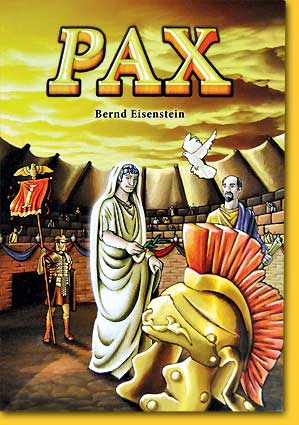 |
Maybe Rome wants pax (peace), but the players don't! These rebel slaves want independence instead of suppression by the Roman establishment. In seven different categories the former slaves attempt to become stronger than Rome. If they succeed, they still have to compete with each other for victory, but if Rome turns out to be stronger than the slaves, the winner is the player that has joined forces with Rome through intrigue.
|
|
|
|
| xx |
|
|
|
|
|
|
|
|
|
|
|
|
|
|
|
|
|
|
|
|
|
|
|
|
|
|
|
|
|
|
|
|
|
|
|
|
|
|
|
|
|
|
|
|
|
|
|
|
|
|
|
|
|
|
|
|
|
|
|
|
| The game contains influence cards in seven different categories. Below each of the 2 to 5 legion cards (always one more than the number of players) a face-up influence card is placed. These cards represent the market. In a player's turn he draws three influence cards from the pile, one at a time. For each card the player immediately decides where it will be placed: one card should be taken into his hand, one card is placed below one of the legion cards, and one card is slipped back under the drawing pile. Each of these options has to be used once; if a player decides to take the first card he draws into his hand but the third card he draws turns out to be even better, he is not allowed to change his mind! |
|
|
|
| x |
|
|
|
|
|
|
|
|
|
|
|
|
|
|
|
|
|
|
|
|
|
|
|
|
|
|
|
|
|
|
|
|
|
|
|
|
|
|
|
|
|
|
|
|
|
|
|
|
|
|
|
|
|
|
|
|
|
|
|
|
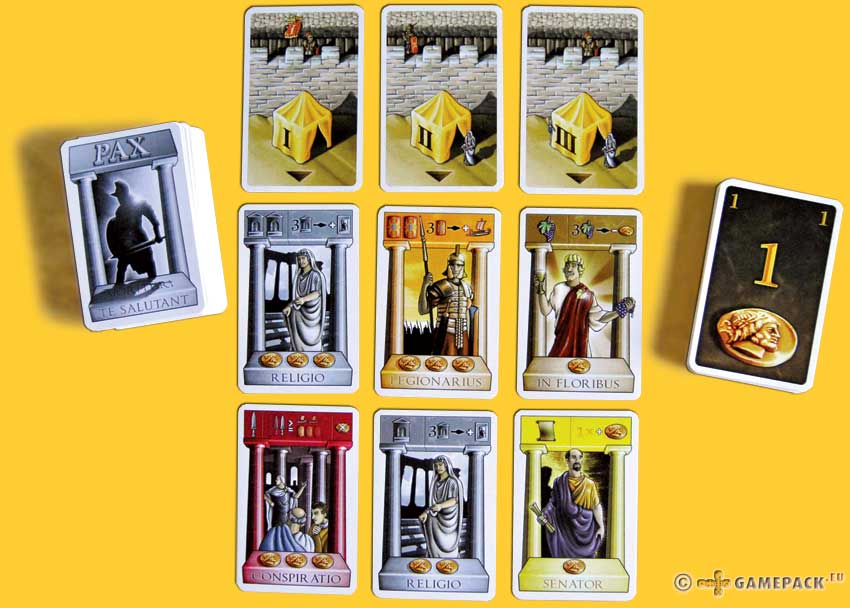 |
|
| x |
|
|
|
|
|
|
|
|
|
|
|
|
|
|
|
|
|
|
|
|
|
|
|
|
|
|
|
|
|
|
|
|
|
|
|
|
|
|
|
|
|
|
|
|
|
|
|
|
|
|
|
|
|
|
|
|
|
|
|
|
|
Next, the player may buy all the influence cards positioned below one of the legion cards; he pays the total value of these cards (1 to 4 gold). After that, he may play cards from his hand. The first card is free of charge, the second card costs one gold, the third card two gold, et cetera. The cards are arranged by category; because there are seven categories each player can build up to seven rows. After playing card the players collect income: as many gold cards as the number of cards in the longest row that has been expanded in this turn. If a player has played two 'new' cards in his turn, this counts as two rows of one card. The longest row that has been expanded in his turn is therefore one card long, this earns him one gold.
|
|
|
|
| x |
|
|
|
|
|
|
|
|
|
|
|
|
|
|
|
|
|
|
|
|
|
|
|
|
|
|
|
|
|
|
|
|
|
|
|
|
|
|
|
|
|
|
|
|
|
|
|
|
|
|
|
|
|
|
|
|
|
|
|
|
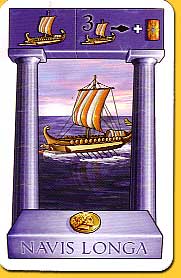 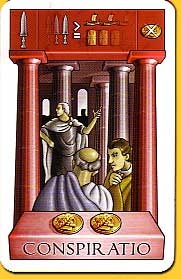 |
The cards have two distinct functions. First, one or two symbols are depicted on each card. At the end of the game players check in how many categories at least one of the players has more symbols than Rome. If this is the case in at least four categories, the players win the game. Additionally, each category has a special feature. Armies and fleets score points at the end of the game. Cypresses and knives are required to be allowed to play armies and fleets: a player can never possess more armies or fleets than cypresses or knives. The player with the highest number of knives receives the Primus Conspiratus card, and he becomes starting player in the next round. But, if a player plays a card with a knife symbol, he does not get any income this turn. |
|
|
|
| x |
|
|
|
|
|
|
|
|
|
|
|
|
|
|
|
|
|
|
|
|
|
|
|
|
|
|
|
|
|
|
|
|
|
|
|
|
|
|
|
|
|
|
|
|
|
|
|
|
|
|
|
|
|
|
|
|
|
|
|
|
| Script symbols earn the player one additional gold in the income phase, but only during the turn in which the card has been played. Every three grape symbols give one discount when purchasing cards from the market, and three or six temples allow the player to draw two or even three cards simultaneously at the beginning of his turn instead of one at a time. When all players have taken their turn, the most expensive row of cards is removed from the market and transferred to Rome; this is how Rome increases her strength. |
|
|
|
|
|
| x |
|
|
|
|
|
|
|
|
|
|
|
|
|
|
|
|
|
|
|
|
|
|
|
|
|
|
|
|
|
|
|
|
|
|
|
|
|
|
|
|
|
|
|
|
|
|
|
|
|
|
|
|
|
|
|
|
|
|
|
|
| Then a new round begins, and this continues until the drawing pile is finished. At that moment Rome receives three additional cards that have been put aside for this purpose at the beginning of the game: this way the players never know exactly how strong Rome is going to be at the end of the game! If Rome is stronger (possessing more symbols) than any of the players in at least four of the seven categories, Rome wins the game. This means that the player holding the Primus Conspiratus card is the winner. Alternatively, when the players are stronger than Rome, points are scored to determine the winner. Each category played scores two points, and each category in which a player is stronger than Rome scores three additional points. Army- and fleet symbols score points, as does the Primus Conspiratus card, and the richest player receives four points. |
|
|
|
| x |
|
|
|
|
|
|
|
|
|
|
|
|
|
|
|
|
|
|
|
|
|
|
|
|
|
|
|
|
|
|
|
|
|
|
|
|
|
|
|
|
|
|
|
|
|
|
|
|
|
|
|
|
|
|
|
|
|
|
|
|
 |
|
| x |
|
| x |
|
| x |
|
 |
|
|
|
|
|
|
|
|
|
|
|
|
|
|
|
|
|
|
|
|
|
|
|
|
|
|
|
|
|
|
|
|
|
|
|
|
|
|
|
|
|
|
|
|
|
|
|
|
|
|
|
|
You start with nothing, but you can improve your position rapidly by playing cards. Long rows result in higher income, and some symbols have specific advantages. In any case each category you have, and each category in which you are stronger than Rome, scores points.
|
|
|
|
| x |
|
|
|
|
|
|
|
|
|
|
|
|
|
|
|
|
|
|
|
|
|
|
|
|
|
|
|
|
|
|
|
|
|
|
|
|
|
|
|
|
|
|
|
|
|
|
|
|
|
|
|
|
|
|
|
|
|
|
|
|
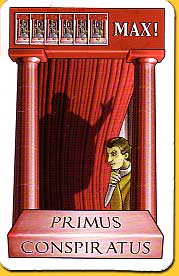 |
|
The goal is clear: playing as many cards as possible is always good! Despite the fact that this is a card game, with the corresponding dose of (bad) luck, you have ample opportunity to influence the course of the game. By adding expensive cards to your hand, you save yourself the cost of buying them in the market, and by placing expensive cards in the market you have influence on which cards that will end up in Rome. It is not too difficult to win from Rome, but it occasionally happens that Rome wins. In that case you'd better possess the primus conspiratus card! This card is always good to have: you become starting player, and if Rome doesn't win, it earns you one point anyway. |
|
|
|
| x |
|
|
|
|
|
|
|
|
|
|
|
|
|
|
|
|
|
|
|
|
|
|
|
|
|
|
|
|
|
|
|
|
|
|
|
|
|
|
|
|
|
|
|
|
|
|
|
|
|
|
|
|
|
|
|
|
|
|
|
|
An endless battle over the primus conspiratus card is prevented by the rule that players may not possess more than six knife cards. Pax is a fun and fast game, with the only disadvantage that there's not much player interaction. That's probably why you can also play it alone. But if you possess two copies, you can even play with 8 players: Rome won't stand a chance!
© 2012 Barbara van Vugt
Pax, Bernd Eisenstein, Iron Games, 2012 - 1 to 4 players, 10 years and up, 30-45 minutes
|
|
|
|
  |
|
|
|
|
|
|
|
|
|
|
|
|
|
|
|
|
|
|
|
|
|
|
|
|
|
|
|
|
|
|
|
|
|
|
|
|
|
|
|
|
|
|
|
|
|
|
|
|
|
|
|
  |
|
|
|
|
|
|
|
|
|
|
|
|
|
|
|
|
|
|
|
|
|
|
|
|
|
|
|
|
|
|
|
|
|
|
|
|
|
|
|
|
|
|
|
|
|
|
|
|
|
|
|
  |
|
|
|
|
|
|
|
|
|
|
|
|
|
|
|
|
|
|
|
|
|
|
|
|
|
|
|
|
|
|
|
|
|
|
|
|
|
|
|
|
|
|
|
|
|
|
|
|
|
|
|
  |
|
|
|
|
|
|
|
|
|
|
|
|
|
|
|
|
|
|
|
|
|
|
|
|
|
|
|
|
|
|
|
|
|
|
|
|
|
|
|
|
|
|
|
|
|
|
|
|
|
|
|
| x |
|
|
|
|
|
|
|
|
|
|
|
|
|
|
|
|
|
|
|
|
|
|
|
|
|
|
|
|
|
|
|
|
|
|
|
|
|
|
|
|
|
|
|
|
|
|
|
|
|
|
|
|
|
|
|
|
|
|
|
|
| x |
|
|
|
|
|
|
|
|
|
|
|
|
|
|
|
|
|
|
|
|
|
|
|
|
|
|
|
|
|
|
|
|
|
|
|
|
|
|
|
|
|
|
|
|
|
|
|
|
|
|
|
|
|
|
|
|
|
|
|
|
 |
|
|
|
|
|
|
|
|
|
|
|
|
|
|
|
|
|
|
|
|
|
|
|
|
|
|
|
|
|
|
|
|
|
|
|
|
|
|
|
|
|
|
|
|
|
|
|
|
|
|
|
 |
|
|
|
|
|
|
|
|
|
|
|
|
|
|
|
|
|
|
|
|
|
|
|
|
|
|
|
|
|
|
|
|
|
|
|
|
|
|
|
|
|
|
|
|
|
|
|
|
|
|
|
| x |
|
|
|
|
|
|
|
|
|
|
|
|
|
|
|
|
|
|
|
|
|
|
|
|
|
|
|
|
|
|
|
|
|
|
|
|
|
|
|
|
|
|
|
|
|
|
|
|
|
|
|
|
|
|
|
|
|
|
|
|
 |
|
|
|
|
|
|
|
|
|
|
|
|
|
|
|
|
|
|
|
|
|
|
|
|
|
|
|
|
|
|
|
|
|
|
|
|
|
|
|
|
|
 |
|
|
|
|
|
|
|
|
|
|
|
|
|
|
|
|
|
|
|
|
|
|
|
|
|
|
|
|
|
|
|
|
|
|
|
|
|
|
|
|
|
|
|